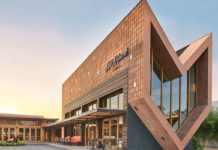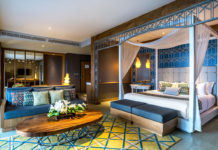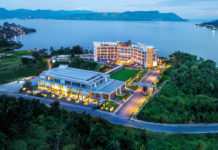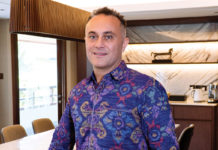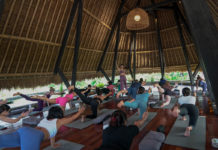Having a generous trait that takes pride in empowering and enriching people, Kanit Sangmookda is a teacher at heart who is all about giving back. He is a stout practitioner of servant leadership, and believes that to be a good leader is to serve others and always be there to provide guidance for the team. As a result of his vast experience in hotels across Asia, Kanit keeps a cool head and has a knack for turning difficulties into opportunities by incorporating fresh ideas and creative solutions.
Q: Could you please tell us the highlights of your career so far and how you ended up here as general manager of Le Méridien Jakarta?
A: I started my hospitality career over 16 years ago in Thailand, with the Marriott in Bangkok. After seven years there, I decided to look out and find another opportunity outside of Thailand. Starwood gave me the opportunity in Kuala Lumpur. My background is revenue management, so back then I was the director of revenue management at The Westin Kuala Lumpur. After a couple of years I got a chance to run for a regional role as a regional director of revenue management for Southeast Asia, which includes, of course, Indonesia, Singapore, Malaysia, the Philippines, and Brunei. I was in that position for three years and I’d actually been to Jakarta a few times and Bali quite a lot of times during that time. Afterwards I was interested in moving back to a hotel but in a bigger role to lead operations as general manager. In 2013, I got my first position as general manager at the Four Points by Sheraton Sandakan Sabah, Malaysia. After around two-and-a-half years I was offered the opportunity to lead Le Méridien Jakarta, and so here I am.
Q: And how did you find transitioning to an operational role as general manager?
A: The role of a property’s leader is more about being a leader in general. You can’t expect a GM to know every single detail about the hotel because their backgrounds are often different. Mine is sales and marketing, while other GMs might come from F&B or room division backgrounds. In general, we need to play the leader role as we support our team. We understand challenges, listen to the team and help them make decisions through effective questioning in order to make the best executive decision. You have to be there when the team needs you.
Q: That is a very interesting point, because a leader is also about serving others right?
A: You are right. I practice a lot of servant leadership, you know how when you’re on top you’re also on the bottom, right? You serve when they need you. Our job is to make sure that people we hire reach their maximum potential in performing their roles.
Q: Would you kindly share your observations about recent trends in the hospitality industry in Asia, particularly in Jakarta?
A: I think the market has been developing strong technological improvements. If you remember how people made reservations 10 years back compared to now, back then they interacted with people, sent emails or faxes, but these days you don’t have to do all that and you can just do everything yourself with a few clicks. To me, however, you shouldn’t forget the essence of this industry, which is connection with people. The service guests receive at the hotel still plays a significant role in their overall staying experience. We need to be able to blend new technologies to make our job more efficient, making our service better, without compromising this very important people value.
Q: Bearing in mind the hotel’s strong identity – one that has been around for decades – how do you maintain that identity while bringing in fresh ideas and new innovations?
A: One of the advantages of being an established name in the market is that people know our name, and in addition, we have a very prime physical location. We need to build upon these strong foundations with whatever the brand can bring. We are continuously rolling out offerings from our Starwood global brand or Le Méridien, such as new perspective items, art and cultural discovery elements, increasing service quality in line with our global standards, augmenting our signature F&B offerings such as our Le Méridien coffee culture, Le Méridien éclair, with new offers that complement these strong points we already have. For example, we are now in the process of room renovations, infusing modern contemporary design trends while not forgetting our Javanese elements in the design. And at the front reception as you can see we are refreshing the look of our wooden panels as well.
Q: Let’s talk about your experience in Jakarta. What’s your impression of the city after living here for around six months?
A: I’m from Bangkok and I’ve worked in Kuala Lumpur for five years, where I travelled quite often to Jakarta. I personally don’t quite feel there’s much difference between Jakarta and Bangkok or Kuala Lumpur, it’s just that each developing city has their own unique characters. One of the things I still like to do is my food adventure almost every weekend. The development of Jakarta’s F&B scene is really amazing. Anywhere you go you can find some nice food, from international to local cuisine. Meanwhile, looking at traffic from another perspective, it depends on how you utilise your time. I use time in traffic to catch up with news, colleagues through social media, or maybe some work, so this way I’m not too bothered by the problem.
Q: What are some of the most memorable moments in your career so far?
A: I have so many memorable staff interactions. I remember people saying that I would remember my first position as general manager for the rest of my life, and it’s true. I went through a lot of unknowns and new experiences such as new training and cross exposures. Several memorable moments include achieving something with your team that you never thought possible. I was in a much smaller town than Jakarta, so we created a running event that ended up having nearly 2,000 people taking part. Also, you get to see who people really are in times of turbulence, you know? One time there was a period of constant power outages – sometimes we didn’t have power for 10 to 12 hours consecutively. We didn’t blame anyone but we were challenged in handling the situation. We turned it around into a candlelit, unplugged dinner theme with the band playing acoustically and serving barbecues and whatever else we could prepare without electricity. It ended up pretty good and the guests enjoyed it. This is what I mean by creating ideas to overcome challenges and survive troubling situations. I like to work closely with my team and for me it’s things like these that are really memorable.
Q: Looking back, what compelled you to start a career in hospitality?
A: My family has a hospitality background. My parents run a Thai restaurant back home, and my real start was working with my parents there. I did a lot of things except cooking that time – I was a waiter, bartender, cashier. This experience nurtured my interest in the service industry. I chose to study hotel management afterwards and I’ve continued to pursue this path until today.
Q: What do you imagine yourself doing if you hadn’t started a career in the industry?
A: I like teaching. I enjoy coaching people. I would say I’d be a lecturer or a trainer of some kind. I actually used to have a part time job as university lecturer back home. I was working in the hotel on weekdays, and I was a lecturer on the weekends. It was my dream when I was studying for my master’s degree in Australia. I could see the difference between our country and Australia’s method of learning and it concerned me. I thought that I should give back however I could. So that’s what I did – after collecting a few years of experience in the hotel, I went back to my university in Thailand. I talked to the dean, who was still the same guy when I was studying there, and I didn’t care how much they paid me, I just wanted to give back and teach. Some of my former students now hold important positions in major hotels and they are still utilising a lot of stuff I taught them in class, and this gives me a real sense of satisfaction. It’s a feeling that you can’t buy.
Q: Now, reaching out to the lecturer inside you, what advice would you give to new, young hoteliers trying to make a break in the industry?
A: First of all, you have to look at the generation shift in the workforce these days. Crossing from generation X to generation Y and the millennials, I strongly believe the industry fundamentals are still the same. However, some people do not appreciate these traditions of the industry. We’re talking about an industry that has evolved with new technology, but some people tend to ignore the baseline that is human interaction. They need to understand that guest relations and service interaction are still important. Another thing is that the new generation likes everything instantly. But some things in hotel operations don’t have shortcuts. There are a lot of things behind the scenes going on and you simply need time to understand the flow and to work properly in that flow. That’s what I mean by appreciating tradition. You can’t always have shortcuts and instant solutions. Those who are successful are usually those who can balance new technology and human interaction. They mustn’t forget people development, having people skills, developing leadership qualities.
Q: Now how do you deal with your younger team members who are ambitious and expect fast promotions and all that?
A: I always want to understand them first and foremost. Second, show them by being a hands-on leader, because if you use mere words they might not listen to you. But if you show and prove to them that what you’re doing is more beneficial, they will eventually see it your way, well most of them anyway. Ultimately, in this industry, a hands-on example is the best method of teaching.





